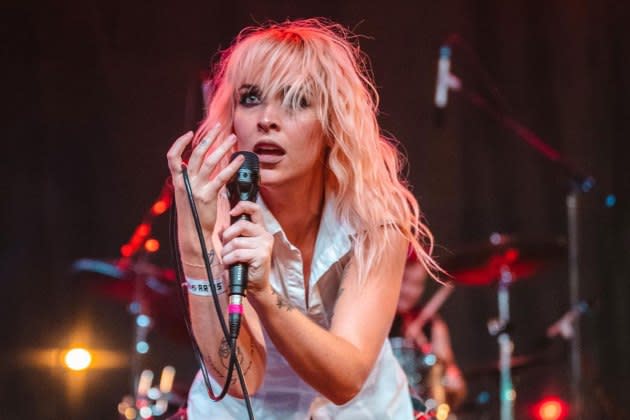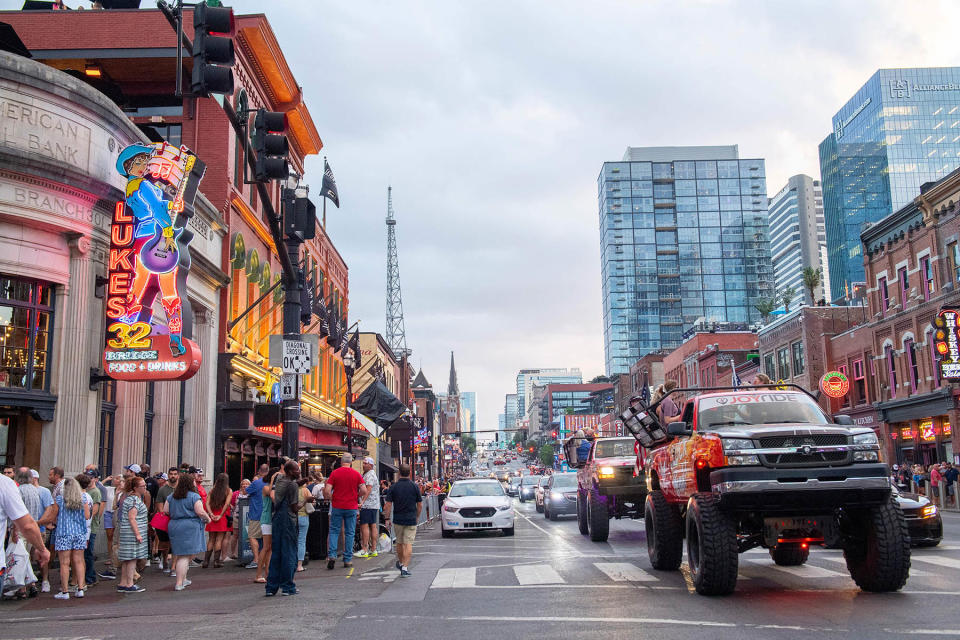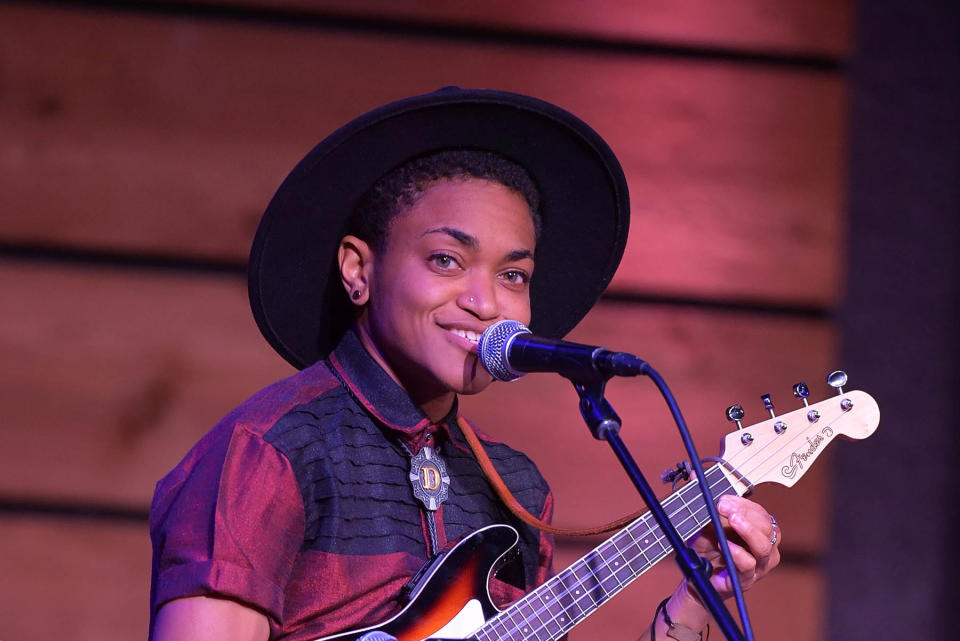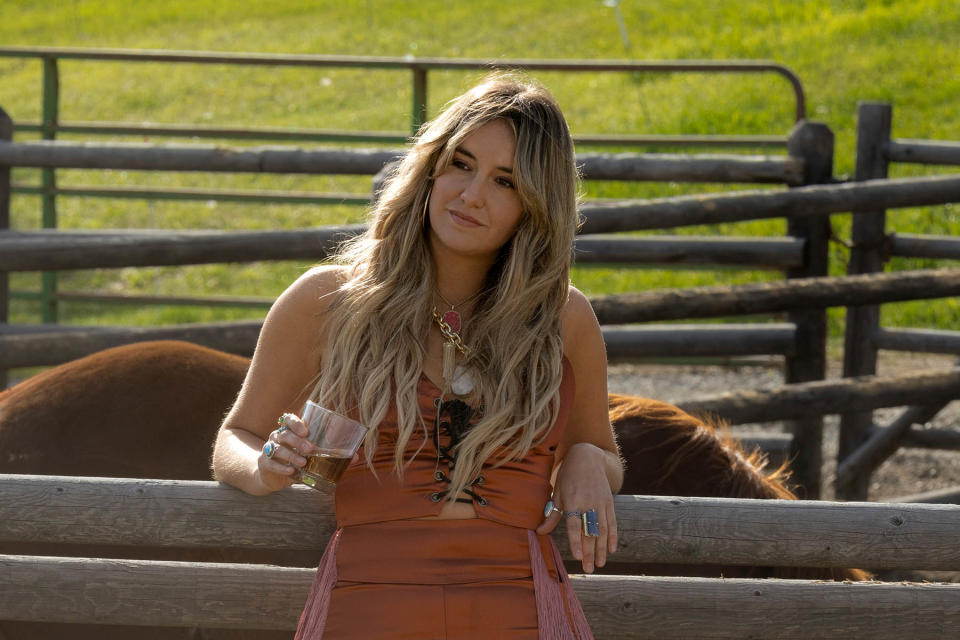Nashville’s Radical Reinvention
- Oops!Something went wrong.Please try again later.
- Oops!Something went wrong.Please try again later.

Tennessee’s cosmopolitan capital has been going through seismic changes, both musically and demographically. As new personalities flock to Nashville, fresh sounds and surprising trends are emerging, providing clues for what the city could look like in 10 years. Here are the musical, cultural, and even political developments we’re watching as Music City continues its rapid revolution.
The Pop Explosion
Nashville is synonymous with country music, but a new wave of pop is having its moment. Artists such as charismatic vocalist Jake Wesley Rogers (opening for Kesha this fall), TikTok phenomenon Stephen Sanchez, “abcdefu” singer Gayle (fresh off Taylor Swift’s Eras Tour), power trio the Foxies, and avant-garde synth-rock band Jive Talk all represent a once-overlooked segment of Music City.
More from Rolling Stone
“This kind of sound has been happening for a long time, but it’s gaining speed because the infrastructure for it to succeed is here,” says Oliver Pierce, Jive Talk’s lead singer. “Nashville is at its core, a music town. We are plugging into a scene that already existed.”
The difference, he says, is a shift in focus away from overt storytelling toward physical connection.
“There are so many writers that are great in the country and Americana world that will tell you what the song is about and the story before the song,” Pierce says, “but I see bands who are more focused on the performance. Bands like Flight Attendant, that want to deliver an experience and have the audience be included in that.”
At clubs like the East Room, Soft Junk, Drkmttr, and the Basement, which hosts an essential New Faces night every week, bands are demolishing stages and getting intimately close to the crowds — which often include fellow artists. Julia Bullock, dynamo frontperson for the Foxies, says the artist community has become increasingly close-knit after the pandemic.
“We all write with each other, we all know each other, we all have heard of each other. So if Stephen Sanchez or the Criticals release this dope new song, we all are going to back it,” says Bullock, who moved the Foxies to Nashville in 2016 after a few years in Brooklyn. “If I were to have gone to L.A. and tried to do what I did here, I don’t know where I would be at the moment. Nashville is such a strong community and a beautiful place for when you want to make a stand for who you are and share your art.”
Pierce concurs. “What’s happening is a focus on community, on something that is new,” he says, “and a step away from the idea of going down to Broadway and hearing ‘Wagon Wheel’ for the millionth time.”

A Changing Broadway
On a recent Monday afternoon on Nashville’s Lower Broadway, a string of bars where country singers have traditionally gone to get discovered, two different bands could be heard performing that old country music staple… “Crazy Train.” Ozzy Osbourne, it seems, has become part of the Broadway soundtrack. While country music still constitutes the bulk of covers played downtown by working musicians, popular party songs from Bon Jovi and Journey to Wild Cherry’s “Play That Funky Music,” are becoming more and more common, all to keep tourists drinking and spending. Meanwhile, space for original songs downtown, with the exception of artist-forward rooms like Acme Feed & Seed, is becoming increasingly rare.
That shift underscores an issue that’s front and center as Nashville prepares to elect a new mayor: the fostering and preservation of the city’s creative class.
“The maxim has been that Nashville is a 10-year town. You really have to grind and hustle, and put in that work to break through. And I think it’s becoming increasingly difficult to even do that,” says Jill McMillan Palm, executive director of the Arts & Business Council of Greater Nashville. “Because of the cost of living, you can’t spend 10 years here. Artists just can’t put in the time and effort to hone their craft.”
In fact, some artists — not just musicians, but painters, writers, and dancers — say they’re already leaving. In a 2021 survey conducted by the Arts & Business Council, a quarter of Nashville artists said they likely would not remain in the city past the next two to three years. Among the reasons given: lack of support from the city and state, and cost of living.
As it relates to live music, Lower Broadway can be seen as a microcosm of a changing city. Working musicians have to search for affordable parking and navigate streets full of slow-moving party vehicles before even starting their four-hour set and passing around the tip jar.
“When I moved to Nashville 10 years ago, playing downtown was a thrill: You’d park nearby, sometimes even on Broadway itself, set up your gear and jam through Merle Haggard and Buck Owens requests,” says Adam Kurtz, a pedal-steel player who performs downtown when not on the road. “I’ve joked that when I become mayor I will mandate a pedal steel in every band. It’s a shame the city let the soul and swagger of a downtown music scene that supported original songs slip away for a price tag.”
Palm, whose org is trying to change the revenue model for Broadway musicians from tips to a living wage, is more diplomatic. “Covers are great,” she says. “But you’re not getting that authentic experience. We’ve created kind of a facsimile of country music.”
A More Inclusive Country
The country music industry has, to put it mildly, a complicated relationship with race. For every Charley Pride or Darius Rucker who’s been afforded institutional support, there are hundreds of Linda Martells and Wendy Motens who haven’t. Recent years have shown some evidence of incremental shifts in the right direction as the conversation around race in Nashville has intensified, both from inside the industry and out.
Country label rosters now include more Black performers (and LGBTQ+ ones) than at any time in the past, for one thing. Kane Brown, Breland, Mickey Guyton, the War and Treaty, Dalton Dover, and Neon Union are all in the mix, though Brown seems to be the only one who’s getting any love from radio at the moment. Straight, white artists are still eating up most of the bandwidth, but some of the barriers to entry are wearing away.
One group leading the effort to make change is Black Opry, which has turned into an intersectional movement for hosting and promoting revue-type showcases for Black performers all around the country. Founder Holly G says the group began in service of her own country-music fandom as a way to not feel so isolated.

“From the onset of this, it was never my intention at all to be any type of activist,” Holly G told Rolling Stone. “I was literally just trying to find a safe space for myself to exist in the music industry. I just wanted to be able to go to concerts and have relationships with consuming the music.”
Even so, Black Opry’s work has been a kind of activism, pushing for more inclusive spaces all around and reminding everyone that country is not and has never been exclusively the domain of white people. “The work is just something we feel compelled that we have to do,” Black Opry co-director Tanner Davenport says.
Parts of the industry are beginning to recognize the value in taking a more inclusive approach. CMT has consistently reaffirmed its commitment to diversity through its various programs and off-screen initiatives like Equal Play. CMA Fest, the premier country-music fan experience, has booked numerous Black performers on its stages every day this year. And WXPN, home of World Café, recently partnered on the Black Opry Residency to help develop artists like Kentucky Gentlemen and Samantha Rise.
That difficult work continues for Black Opry, since it often falls to the people struggling to be heard to create space, rather than the people in power. That’s not ideal, but according to Holly G, it’s necessary for the future of country music and Nashville.
“It sucks that we’re in this position, that the people who are marginalized are having to turn and do the work,” Holly G says, “but honestly, that’s the only way I see it happening.”
The Yellowstone Effect
Earlier this year, some of country music’s most gifted songwriters, from Miranda Lambert and Hillary Lindsey to Sunny Sweeney and Jonathan Terrell assembled in nondescript writers’ rooms around Nashville’s Music Row to write songs for country and roots music’s unexpected starmaker: Yellowstone.
Despite being slated to end its five-season run in November (and be replaced by a spin-off with Matthew McConaughey), the Paramount series about a ranching family and the often bloody drama that follows it has given country music Western fever. Record labels are championing artists with rough-hewn aesthetics like Jackson Dean, Sterling Drake, and even one of Yellowstone’s own cast, Luke Grimes. Festivals like Backcountry in Nevada and Under the Big Sky in Montana are being held on actual working ranches. And artists who are lucky enough to catch the ear of Yellowstone’s music supervisor, Andrea von Foerster, see their profiles rise as soon as their featured episode airs.
“It really has legitimized me,” says singer-songwriter Dani Rose, who has had four of her songs, including the menacing “Chess,” soundtrack key scenes. “Yellowstone bumped up my monthly streaming listeners to [nearly] 100,000 listeners, which was crazy, going from really nothing to being put on playlists and being asked to play different festivals, just based off of the fact that I had music on the show.”

Some artists have crossed over from music to the show itself. Lainey Wilson, Nashville’s new country radio star with hits like “Watermelon Moonshine” — also heard on the series — played a version of herself on Yellowstone and even brought along her band members (who’ve since been asked to sign autographs by hardcore Dutton fans).
Rose says the appeal of the music on Yellowstone is due to its honest origins. Like life on the Dutton Ranch, daily existence can be dark — if, hopefully, less violent. “On the show, there’s murder, death, rape…a ton of shit that goes on that is so horrifying and so terrible,” she says. “And yet some of us writers, our life isn’t a movie, but we’ve experienced some true pain. And that’s what we’re able to write about.”
The Red Coast
Last fall, conservative media personality Candace Owens hosted the premiere of her film The Greatest Lie Ever Sold: George Floyd and the Rise of BLM at the Woolworth Theatre in downtown Nashville, the same site where the late civil rights hero and congressman John Lewis had been part of the Nashville Student Movement’s demonstrations in the 1960s. Those in attendance included Kanye West, Jason Aldean, and Kid Rock, a group of musicians who’ve had no shortage of appalling things to say in the last couple of years.
If all of that seems contradictory, that is present-day Nashville in a nutshell. Owens, along with her employer the Daily Wire, has been a part of a movement in which people and companies have left the coasts behind for Tennessee, largely in Nashville and its surrounding areas. Commentator Tomi Lahren relocated during Donald Trump’s presidency, much of the Daily Wire staff (among them Owens and Matt Walsh) came more recently, joining established conservatives like Clay Travis and Dave Ramsey as part of the brain trust in Music City.
“It’s become this gathering place for, in my opinion, radical right views where this very conservative Tennessee supermajority has raised the flag to say that they’ll be welcome here and they’ll be empowered here and supported,” Justin Kanew, who runs the progressive website Tennessee Holler, says of the movement. To be certain, the Tennessee legislature — the same one that’s backed a staggering number of anti-abortion and anti-LGBTQ laws this year — drafted up official congratulations when Lahren and Owens first moved to town.
Kanew sees it as related to what’s going on with the state government, which successfully took a representative seat away from consistently-blue Nashville in the last election cycle by splitting it into three neighboring districts that all went for Republicans. Everyone else in the United States should be paying attention, because the implications are huge.
“From a legislative perspective, they sort of see Tennessee as the guinea pig,” Kanew says. “They try to see what they can get away with here and then they export it to the rest of the country.”
Tennessee currently has the highest concentration of evangelical Protestants of anywhere in the U.S., and the state government has harnessed that. “We’re a theocracy in my opinion, and kind of an open one. They will tell you that if you ask them,” Kanew says, adding that leaders “see government as an arm of the church,” in full disregard of the idea of their separation.
It’s made Tennessee into an unlikely battleground for the future of the nation, despite it not being considered a swing state from a voting perspective. The rest of the nation finally got a glimpse at how far things had gone in April when representatives Justin Jones, Justin Pearson, and Gloria Johnson — now known as the “Tennessee Three” — were punished for interrupting the legislature and demanding gun reform in the wake of the Covenant School shooting in Nashville. It led to the expulsion of the two Justins, who are both Black, followed by outrage and backlash from all corners of the nation. (The two lawmakers were eventually reinstated.)
That moment ended up being one of the best advertisements possible for the courage and righteousness of up-and-coming Democrats, as well as an object lesson in why it’s important to dig in and fight. It was a little glimpse at what Nashville could be for people want a more inclusive and welcoming place for all.
“It’s really important that those people stand up and keep standing up — not just once, but over and over again,” Kanew says, “because that’s what it’s going to take.”
Best of Rolling Stone

